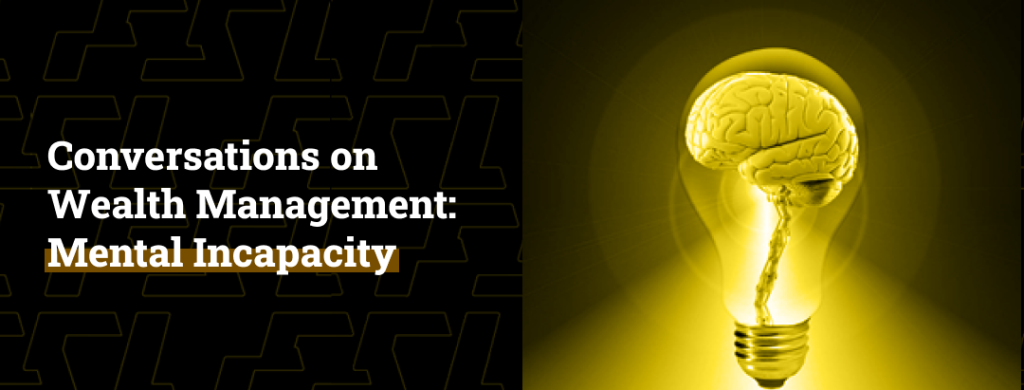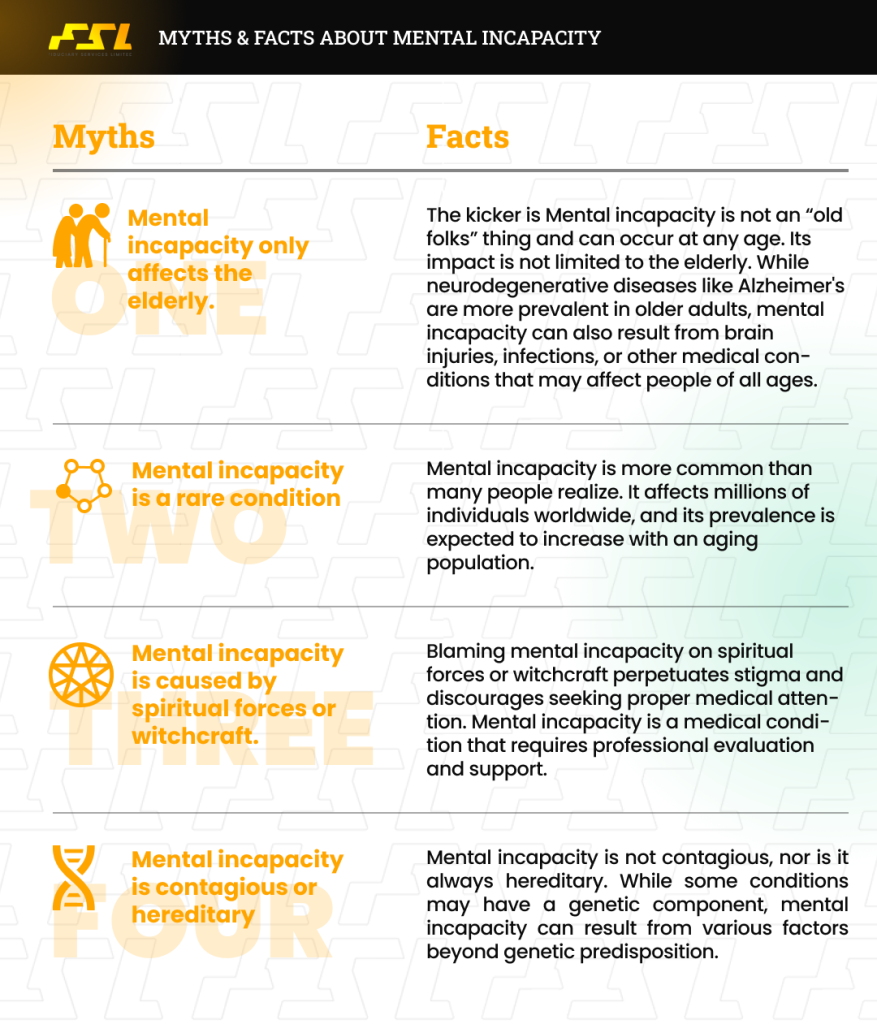
Picture this: you wake up one morning and you find it challenging to remember your own name or even recognize your loved ones. Again, picture yourself in a situation where you can’t recall important events from your past and recent conversations and suddenly you are unable to make informed decisions because your cognitive abilities have taken a hit. Due to your hefty financial responsibilities and complex business affairs as a high-net-worth individual, the possibility of becoming mentally incapacitated be a real jump scare.
Mental Incapacity, an absolute respecter of no persons, can leave you feeling lost and confused in your own world, cast a cloud on your memories and cause them to easily slip through your fingers like sand. That being said, mental incapacity is no small matter at all. Often caused by factors such as natural factors (age), neurodegenerative diseases, traumatic brain injuries, and other neurological disorders, mental incapacity reveals itself with signs such as memory loss, confusion, and impaired judgement.
Despite its prevalence, there are numerous misconceptions and myths surrounding mental incapacity that have hindered proper understanding of the subject, the salient issues arising from it, and have limited the support for those impacted in Nigeria and the world at large.

Understanding Mental Incapacity and Dispelling Global Myths
Mental incapacity refers to a condition in which an individual’s cognitive abilities are impaired to the extent that they struggle to make informed decisions and manage their daily affairs. It is essential to recognize that mental incapacity is not synonymous with mental illness. While mental illness may affect an individual’s emotional well-being and behaviour, mental incapacity primarily revolves around cognitive impairments.
The causes of mental incapacity can be diverse and may include neurodegenerative diseases like Alzheimer’s and dementia, traumatic brain injuries, strokes, or other neurological disorders. The manifestations of mental incapacity vary widely from person to person but can encompass memory loss, confusion, disorientation, difficulty in communication, and impaired judgment.
Myths, they say, are powerful stories that shape our beliefs, influence our actions, and weave the fabric of our cultures. However, by definition, they are widely held but false beliefs/ideas about a subject or the misrepresentation of the truth. There are several myths about mental incapacity that have hindered the proper understanding of it and contributed to the salient issues arising from it. Below are some of these myths:


Nigeria – National Mental Health Act, 2021
The National Mental Health Act, 2021 refers to a state of mental health well-being (mental capacity) as that in which an individual realises his or her own potential, can cope with the normal stresses of life, can work productively and fruitfully, and is able to contribute to his or her community. While an individual with mental health conditions would have impairments, activity limitations, and individual and participatory restrictions arising from diagnosable mental disorders which involve significant changes in thinking, emotion, or behaviour and cause distress or problems in the interaction between the individual and his environment and include intellectual, psychosocial or cognitive disabilities.
Furthermore, mental or psychological incapacity is defined as an individual’s inability to:
(a) understand the information given concerning the nature of the disorder ;
(b) understand the consequences that his or her decisions and actions have for his or her own life or health and for the life and health of others, which may be serious and irreversible ;
(c) understand that treatment might mitigate or remedy the condition and that lack of treatment might aggravate it ;
(d) understand the information about the nature of treatment proposed, including the means of treatment, its direct effects, and its possible side effects; and
(e) effectively communicate with others regarding his or her condition and his or her consent to treatment or hospitalisation.
The 2021 Act aims to protect the rights of individuals with mental health conditions and to provide for their welfare, treatment, and care.
Under the Act, people with mental health illnesses are protected from all forms of abuse, violence, and torture. It empowers and advocates for their right to access social services such as healthcare, education, employment, and housing. It also protects their right to voluntary admission and treatment, permitting involuntary admission only if necessary and in the best interests of the person with a mental health condition. Hence anyone who violates the rights of people with mental illnesses, if convicted, will be imprisoned for at least one year or fined accordingly.

Practical Solutions in Dealing with Wealth in the Event of Incapacity:
Before we discuss the various ways High Net-Worth Individuals (HNWIs) can protect themselves and their wealth in the event of incapacity, let us discuss some of the salient issues around mental incapacity facing HNWIs in Nigeria. There are a number of salient issues and matter arising on mental incapacity in Nigeria that needs to be explored.
One fundamental issue is the lack of awareness of the legal status on issue of mental incapacity. Many HNWIs in Nigeria are not aware of what mental incapacity is, or what the legal implications of being declared mentally incapacitated are. Here’s the real tea: mental incapacity awareness in Nigeria is relatively low and it is not just the HNWIs but their families too who might miss the early signs of cognitive decline. This lack of awareness can lead to them being taken advantage of, or their rights being violated.
Another prevalent issue is the stigma associated with mental incapacity. Nigeria, like many other countries, faces deep-rooted socio-cultural stigmas and discrimination surrounding mental health and incapacity. Individuals and families may avoid seeking help due to fear of judgment or ostracization from their families. In Nigeria, mental incapacity is often seen as a sign of weakness or failure. This stigma can discourage people from seeking help for mental health problems and can make it difficult for them to be declared mentally incapacitated if and when they need to be.
Let’s talk money. HNWIs handle big financial portfolios, investments, and businesses, and they need their wits about them to do it right. However, a myriad of salient issues present themselves when mental incapacity comes knocking, all that savvy goes out the window, leading to potential financial losses and disputes among family and business associates which may ultimately result in the mismanagement or loss of hard-earned wealth.
We will continue with our discussions on practical solutions when dealing with wealth and mental incapacity in the next edition of this Newsletter.
In the meantime, our following newsletters will be insightful to you:
1. 7 Ages of High-Net-worth Individuals (HNWIs) and Family Age 7: Legacy and Wealth Transfer
2. 7 Ages of High Networth Individuals (HNWI) and Family – Part 4
3. 2023 – Conversations on Wealth Management
As part of our Private Client services, we have experienced Trust and Estate Planning Advisors ready to assist you in developing an estate plan that protects, preserves, and sustains you and your family’s wealth for generations.
Get in touch with one of our professionals today by sending an email to contact@fiduciaryservicesltd.com



